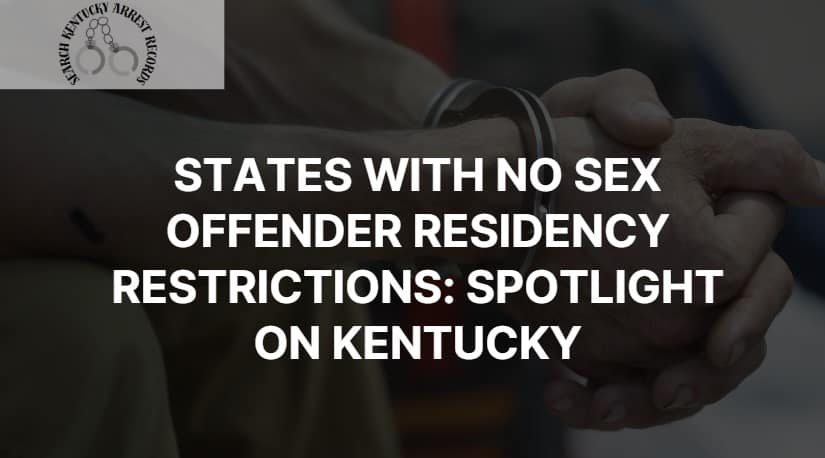Hey there, welcome back! Today, I’m tackling an important topic—sex offender residency restrictions—and how they vary from state to state. You’d think there would be one standard rule, but no, each state does things its own way. Kentucky, in particular, stands out, and that’s where we’ll put our main focus. So, let’s analyze States With No Sex Offender Residency Restrictions and States With Tougher Residency Laws – where is Kentucky?
14 Best States Without Broad Residency Restrictions
Let’s start by talking about states that don’t have blanket residency restrictions. These states give sex offenders a bit more freedom in choosing where they live, allowing them to reintegrate into society without harsh state-wide limitations. Some of these states include:
- Known for its flexibility, Vermont doesn’t have state-wide laws that dictate where sex offenders can or cannot live. Local jurisdictions may impose their own rules, but offenders have much freedom overall.
- While some states are tightening up their controls, New Mexico is more lenient in this regard. I have researched all departments in the state and there are currently no strict restrictions in any part of the state.
- Also, if you are looking for a state where you will feel more relaxed and not have to worry about where a school or daycare will be located, I recommend you take a closer look at Arizona. Arizona focuses less on where offenders can live and more on rehabilitation.
- Minnesota. Here, you won’t find strict residency rules either. Offenders can live almost anywhere, provided they meet any local requirements that may apply.
- Connecticut is another state offering freedom for offenders in terms of residency, with minimal interference from state law.
- No blanket state laws exist, and while local jurisdictions may add restrictions, overall, Alaska allows more flexibility.
There are also New Jersey, Virginia, Hawaii, Maryland, West Virginia, Pennsylvania, North Dakota, and Wisconsin.
Kentucky’s Residency Restrictions: Where Does It Stand?
Now, let’s zero in on Kentucky. If you’ve ever wondered what the rules are here, I’ve got you covered. Kentucky is a bit of a middle-ground state when it comes to sex offender residency restrictions. There are no state-wide, one-size-fits-all rules for everyone.
For sex offenders who were convicted of crimes against minors, Kentucky does have specific restrictions. They can’t live within 1,000 feet of schools, playgrounds, or daycare centers. This rule helps protect children, but doesn’t entirely limit offenders from living in other areas.

What makes Kentucky unique is the balance it strikes. On one hand, it imposes strict rules to protect children. On the other hand, it doesn’t go as far as some states, like Iowa or Alabama, where broad, blanket rules make it nearly impossible for offenders to find housing.
Another important point to consider is that local jurisdictions in Kentucky can add their own restrictions. So, depending on the city or county, the laws might vary. This makes it crucial for offenders to check local regulations before deciding on a place to live. Kentucky’s flexible approach means that while offenders face some limitations, they still have more housing options compared to stricter states.
Read also: Self-Defense Laws In Kentucky
8 States With Tougher Residency Laws
For comparison, let’s take a look at some states with much tougher laws. These are states where offenders are often heavily restricted, making it hard for them to find housing that complies with the rules. Some of the most stringent states include:
- Offenders in Louisiana face a lot of restrictions. They can’t live within certain distances of schools, parks, playgrounds, or even churches. This makes finding a legal residence challenging, especially in densely populated areas.
- Georgia is another state with strict residency laws. Offenders are banned from living near schools, bus stops, parks, or any place where children gather. The restrictions are broad and apply to all sex offenders, regardless of whether their crime involved a child.
- Arkansas enforces some of the harshest residency laws in the country. In many cases, offenders can’t live within 2000 feet of schools, parks. These rules make it extremely difficult for offenders to find housing, particularly in urban areas.

Also in states like California, Michigan, Missouri, Oklahoma, Washington, offenders often face significant challenges when reintegrating into society. The restrictions severely limit where they can live, which sometimes leads to homelessness or isolated living conditions.
The Debate: Should Restrictions Be Relaxed?
This is a topic that I think we can talk about forever. After all, everyone here has their own opinion and it will be correct and worthy of consideration. Do these restrictions really help or do they do more harm than good? Supporters of strict laws argue that they want their children to be protected first and foremost and they understand that if they let their children go for a walk on the playground, they can do their own thing and not make sure that they are not offended.
On the other hand, some experts argue that these restrictions can actually increase the risk of reoffending. That is, they support the idea that if a person is released from prison, then he has corrected himself and understood his mistakes. And if he is restricted even when free, then for him it can be psychologically difficult, the trigger that he is a criminal will not leave him even when free. When offenders cannot find stable housing or properly reintegrate, this creates a positive cycle for a person that is difficult to break and he will no longer want to return to a marginal lifestyle.
Kentucky’s approach, which is less restrictive than some other states, may offer a more balanced solution. By focusing restrictions only on areas where children are present and keeping other options open, Kentucky aims to protect vulnerable populations while giving offenders a chance to rebuild their lives.
FAQ
What are the residency restrictions for sex offenders in Kentucky?
Kentucky has specific restrictions for offenders convicted of crimes against minors. They are prohibited from living within 1,000 feet of schools, daycare centers, and playgrounds. For other offenders, the state doesn’t impose broad residency restrictions.
Can local jurisdictions in Kentucky impose their own rules?
Yes, of course. I advise you to check everything with your state government agencies.
How does Kentucky compare to other states in terms of residency laws?
It seems to me that everything is quite loyal here. After all, a person is not prohibited from being in the state, but there are still some restrictions on being near children’s institutions.
Are there any states without residency restrictions for sex offenders?
Yes, states like Vermont, and New Mexico don’t have state-wide residency restrictions for sex offenders. These states give offenders more freedom to choose where they live.
Conclusion
In the end, each state handles sex offender residency restrictions in its own way. States like Vermont and New Mexico are more lenient, while Kentucky takes a middle-ground approach, targeting restrictions around schools and playgrounds but offering flexibility elsewhere. This balanced perspective gives offenders a chance to reintegrate while keeping children safe. Compared to places like Georgia or Arkansas, where strict rules can limit housing options, Kentucky offers a more practical solution for both protection and rehabilitation. It’s all about finding that sweet spot!
